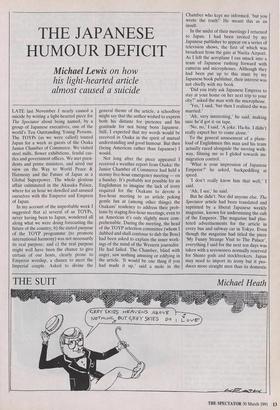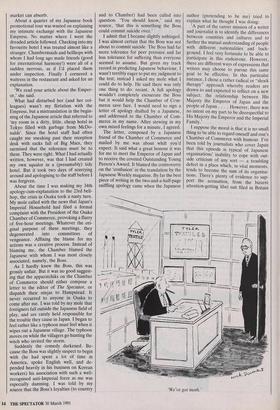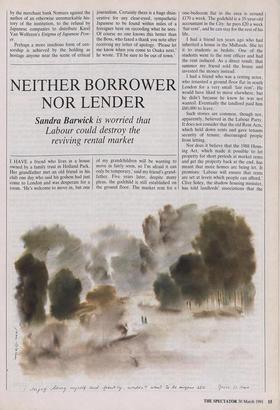THE JAPANESE HUMOUR DEFICIT
Michael Lewis on how
his light-hearted article almost caused a suicide
LATE last November I nearly caused a suicide by writing a light-hearted piece for The Spectator about being named, by a group of Japanese executives, one of the world's Ten Outstanding Young Persons. The TOYPs (as we were called) toured Japan for a week as guests of the Osaka Junior Chamber of Commerce. We visited steel mills, flower exhibitions, feudal cas- tles and government offices. We met presi- dents and prime ministers, and aired our view on the Way to World Peace & Harmony and the Future of Japan as a Global Superpower. The whole glorious affair culminated in the Akasaka Palace, where for an hour we dawdled and amused ourselves with the Emperor and Empress of Japan. In my account of the improbable week I suggested that a) several of us TOYPs, never having been to Japan, wondered all along what we were doing forecasting the future of the country; b) the stated purpose of the TOYP programme (to promote international harmony) was not necessarily its real purpose; and c) the real purpose might well have been the chance to give certain of our hosts, clearly prone to Emperor worship, a chance to meet the Imperial couple. Asked to divine the general theme of the article, a schoolboy might say that the author wished to express both his distaste for pretence and his gratitude for not being born Japanese. Still, I expected that my words would be received in Osaka in the spirit of mutual understanding and good humour. But then (being American rather than Japanese) I would.
Not long after the piece appeared I received a weather report from Osaka: the Junior Chamber of Commerce had held a stormy five-hour emergency meeting — on a Sunday. It's probably not possible for an Englishman to imagine the lack of irony required for the Osakans to devote a five-hour meeting to an article poking gentle fun at (among other things) the Osakans' tendency to address their prob- lems by staging five-hour meetings; even to an American it's only slightly more com- prehensible. During the meeting, the head of the TOYP selection committee (whom I dubbed and shall continue to dub the Boss) had been asked to explain the inner work- ings of the mind of the Western journalist. He had failed. The Chamber, blind with anger, saw nothing amusing or edifying in the article. 'It would be one thing if you had made it up,' said a mole in the Chamber who kept me informed, tut you wrote the truth!' He meant this as an insult.
In the midst of their meetings I returned to Japan. I had been invited by my Japanese publisher to appear on a series of television shows, the first of which was broadcast from the gate at Narita Airport. As I left the aeroplane I ran smack into a team of Japanese rushing forward with cameras and microphones. Although they had been put up to this stunt by my Japanese book publisher, their interest was not chiefly with my book.
`Did you truly ask Japanese Empress to stay at your home on her next trip to your city?' asked the man with the microphone.
`Yes,' I said, tut then I realised she was married.'
‘Ah, very interesting,' he said, making sure he'd got it on tape.
`No, no,' I said, 'A joke. Ha-ha. I didn't really expect her to come alone.'
To the general amusement of a plane- load of Englishmen this man and his team actually raced alongside the moving walk- way, filming me as I glided towards im- migration control.
`What is your impression of Japanese Emperor?' he asked, backpeddling at speed.
`I don't really know him that well,' I said.
`Ah, I see,' he said.
But he didn't. Nor did anyone else. The Spectator article had been translated and reprinted by a liberal Japanese weekly magazine, known for undermining the cult of the Emperor. The magazine had plas- tered advertisements for the article in every bus and subway car in Tokyo. Even though the magazine had titled the piece `My Funny Strange Visit to The Palace', everything I said for the next ten days was taken with a seriousness normally reserved for Shinto gods and stockbrokers. Japan may need to import its irony but it pro- duces more straight men than its domestic market can absorb.
About a quarter of my Japanese book promotional tour was wasted on explaining my intimate exchange with the Japanese Empress. No matter where I went the dreaded article followed. Checking into my favourite hotel I was treated almost like a stranger. Chambermaids and bellhops with whom I had long ago made friends (good for international harmony!) were all of a sudden nervous, as if I'd placed them under inspection. Finally I cornered a waitress in the restaurant and asked for an explanation.
'We read your article about the Emper- or,' she said.
What had disturbed her (and her col- leagues) wasn't my flirtation with the Empress, but a mistranslation in the begin- ning of the Japanese article that referred to 'my room in a dirty, little, cheap hotel in Tokyo filled with garbage from McDo- nalds' . Since the hotel staff had often caught me sneaking past their reception desk with sacks full of Big Macs, they surmised that the reference must be to them. They were right. What I had actually written, however, was that I had created my own squalor in a (presumably) tidy hotel. But it took two days of scurrying around and apologising to the staff before I was forgiven. About the time I was making my 34th apology-cum-explanation to the 23rd bell- hop, the crisis in Osaka took a nasty turn. My mole called with the news that Japan's Imperial Household had filed a formal complaint with the President of the Osaka Chamber of Commerce, provoking a flurry of five-hour meetings. Whatever the ori- ginal purpose of these meetings, they degenerated into committees of vengeance. Affixing the blame for my actions was a creative process. Instead of blaming me, the Chamber blamed the Japanese with whom I was most closely associated, namely, the Boss.
As I hardly knew the Boss, this was grossly unfair. But it was no good suggest- ing that the apparatchiks on the Chamber of Commerce should either compose a letter to the editor of The Spectator, or dispatch their ninjas to Hampstead. It never occurred to anyone in Osaka to come after me. I was told by my mole that foreigners fall outside the Japanese field of play, and are rarely held responsible for the trouble they cause in Japan. I began to feel rather like a typhoon must feel when it wipes out a Japanese village. The typhoon moves on while the villagers go hunting the witch who invited the storm.
Suddenly the comedy darkened. Be- cause the Boss was slightly suspect to begin with (he had spent a lot of time in America, spoke English well, and de- pended heavily in his business on Korean workers) his association with such a well- recognised anti-Imperial force as me was especially damning. I was told by my source that the Boss's loyalties (to country and to Chamber) had been called into question. 'You should know,' said my source, 'that this is something the Boss could commit suicide over.'
I admit that I became slightly unhinged. I was almost certain that the Boss was not about to commit suicide. The Boss had far more tolerance for peer pressure and far less tolerance for suffering than everyone seemed to assume. But given my track record in predicting Japanese behaviour, I wasn't terribly eager to put my judgment to the test; instead I asked my mole what I could do to help. He said there was only one thing to do: recant. A full apology wouldn't completely exonerate the Boss but it would help the Chamber of Com- merce save face. I would need to sign a letter of apology drafted by a Japanese, and addressed to the Chamber of Com- merce in my name. After stewing in my own mixed feelings for a minute, I agreed.
The letter, composed by a Japanese friend of the Chamber of Commerce and mailed by me was about whit you'd expect. It said what a great honour it was for me to meet the Emperor of Japan and to receive the coveted Outstanding Young Person's Award. It blamed the controversy on the 'confusion' in the translation by the Japanese Weekly magazine. By far the best piece of writing in the two-and-a-half-page sniffling apology came when the Japanese author (pretending to be me) tried to explain what he thought I was doing: 'A part of the career mission of a writer and journalist is to identify the differences between countries and cultures and to further the mutual understanding of people with different nationalities and back- ground. I feel very fortunate to be able to participate in this endeavour. However, there are different ways of expressions that writers may choose to pursue this same goal to be effective. In this particular instance, I chose a rather radical or "shock therapy" approach whereby readers are drawn to and expected to reflect on a new subject: the relationship between His Majesty the Emperor of Japan and the people of Japan . . . . However, there was no intent on my part to be disrespectful to His Majesty the Emperor and the Imperial Family.'
I suppose the moral is that it is no small thing to be able to regard oneself and one's Chamber of Commerce with humour. I've been told by journalists who cover Japan that this episode is typical of Japanese organisations' inability to cope with out- side criticism of any sort — a troubling defect in a place which, in vital moments, tends to become the sum of its organisa- tions. There's plenty of evidence to sup- port the accusation, from the bizarre attention-getting libel suit filed in Britain 'We've got moth.' by the merchant bank Nomura against the author of an otherwise unremarkable his- tory of the institution, to the refusal by Japanese companies to distribute Karel Van Wolferen's Enigma of Japanese Pow- er.
Perhaps a more insidious form of cen- sorship is achieved by the holding as hostage anyone near the scene of critical journalism. Certainly there is a huge disin- centive for any clear-eyed, sympathetic Japanese to be found within miles of a foreigner bent on recording what he sees. Of course no one knows this better than the Boss, who faxed a thank you note after receiving my letter of apology. 'Please let me know when you come to Osaka next,' he wrote. 'I'll be sure to be out of town.'




















































 Previous page
Previous page